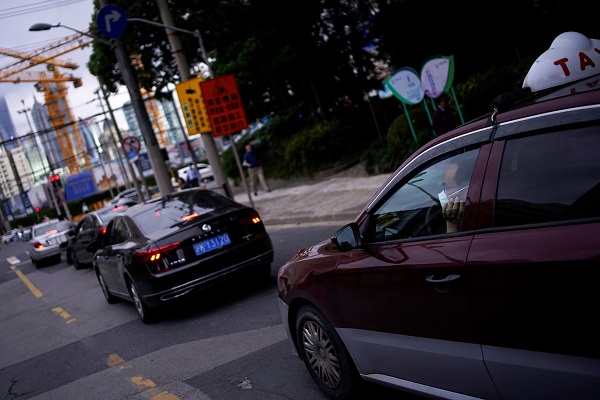Cabbie stranded for two weeks makes himself useful as community volunteer

A taxi driver wears a protective face mask as he drives in Shanghai, on June 9, 2020. [Photo/Agencies]
When Shanghai taxi driver Peng Hui took passengers to a residential neighborhood in Zhoupu town, Pudong New Area, on Nov 20, he ended up being told he would have to remain there for two weeks.
The 35-year-old arrived in Shanghai from Xinghua, Jiangsu province, with his parents a decade ago.
When the company Peng worked for suspended some of its business due to the COVID-19 pandemic, he left to drive taxis for car-hailing giant Didi Chuxing. He also landed a job with a Japanese health care and service company in Lujiazui area.
However, his life changed dramatically when two residents in the Mingtian Huacheng residential neighborhood were confirmed with COVID-19 on Nov 20. Peng arrived at the community with his passengers at 9:30 pm.
The security guard at the entrance checked their temperatures before allowing the cab to enter, but when Peng prepared to leave five minutes later, he was told the community would be shut down the following day and that people would only be allowed to enter, not to leave.
"Initially, I was really confused and couldn't believe I was experiencing anything like this," said Peng, who thought he might be allowed to leave after producing a negative COVID-19 test result.
That night, Peng slept in his cab until staff members from the neighborhood committee told him he must be quarantined in the community for 14 days after it was categorized as a medium-risk area, along with Xinsheng residential neighborhood and Yingqian village, Zhuqiao town.
"I was very anxious and didn't know what to do next, but my girlfriend gave me good advice. She said that as I was in such a situation, I should find something meaningful to do," he said.
He decided to move into a neighborhood committee activity room, where staff members brought him daily necessities, including towels, toothbrushes, sheets and a duvet.
"I've been eating one meat and three vegetarian dishes with cadres from the neighborhood committee in recent days. Although I don't have any relatives or friends here, the time I've spent with the residents and staff has made me feel that we've known each other for a long time," Peng said.
Completing COVID-19 testing in such a large community, which has more than 2,000 households and 6,000 residents, and returning life to normal is no easy task.
Watching cadres and the committee workers as they collected nucleic acid test samples, inquired about the health of every family and sent in food, Peng decided to become a community volunteer, even though this meant going without proper sleep.
In recent days, his most important task has been to help residents complete the paperwork needed for leave of absence from work. He has filled out the forms and helped copy ID cards and other documents.
He said hundreds of people came on the first day to get their paperwork done. They all cooperated.
Meanwhile, he is also assisting the neighborhood committee to supply residents with daily necessities and is tackling urgent problems.
"There have been some special situations. For example, one resident has applied to take an important examination, for which he has been preparing for a year. We have contacted a temporary examination center for him," Peng said.
According to the neighborhood committee, residents can buy vegetables and other daily necessities by phone or through WeChat groups during the quarantine period. Food deliveries and packages can be left outside the main gate.
People from different sectors of society have donated food, bottles of water and other supplies to the community.
Four days after being stranded, Peng said life in the community had returned to some degree of normality.
Residents have adapted to the situation and are walking their dogs, exercising outside and even going fishing.
 Contact Us
Contact Us

 Pudong lights up city with spectacular shows and cultural marvels
Pudong lights up city with spectacular shows and cultural marvels Brilliant light show to illuminate Huangpu River
Brilliant light show to illuminate Huangpu River Maple leaves paint splendid scenery in Pudong
Maple leaves paint splendid scenery in Pudong Appreciate alluring lotus blossoms in Pudong's Century Park
Appreciate alluring lotus blossoms in Pudong's Century Park


